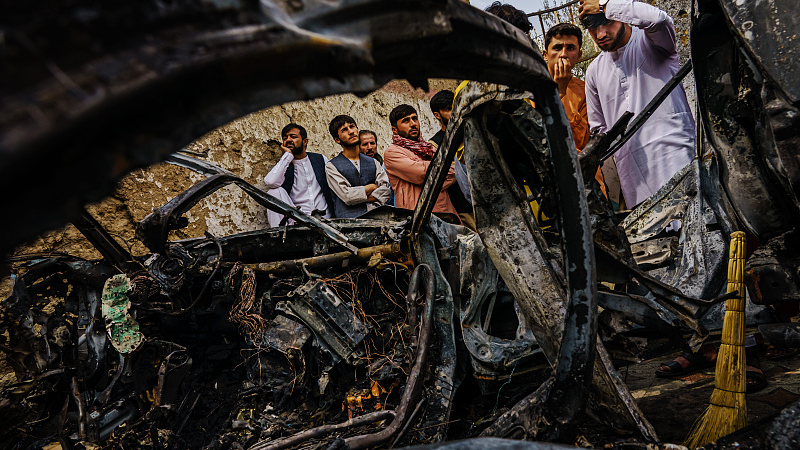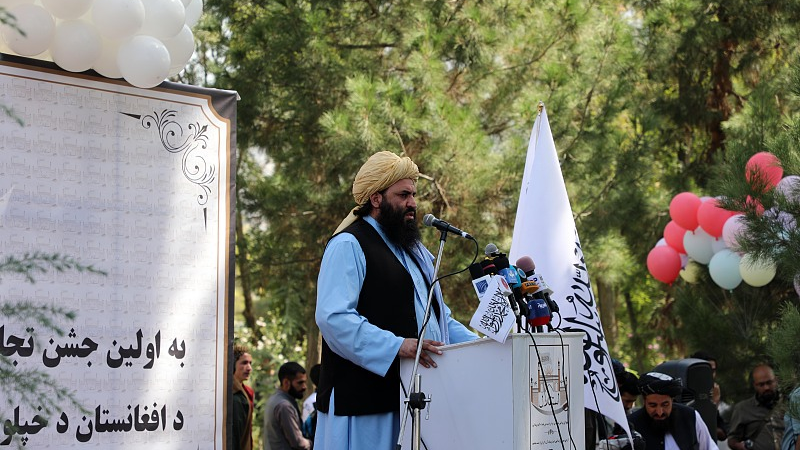
A vehicle targeted and hit by an American drone strike, which killed 10 people including children, in Kabul, Afghanistan, August 30, 2021. /CFP
A vehicle targeted and hit by an American drone strike, which killed 10 people including children, in Kabul, Afghanistan, August 30, 2021. /CFP
Editor's note: This is the ninth piece in the series "One Year: Taliban in, U.S. out." Pu Jingxin is an associate professor of the School of Foreign languages at Nanjing University of Finance and Economics, a research fellow of the Shanghai Center for RimPac Strategic and International Studies and a non-resident research fellow of the Global Engagement Academy, Shandong University (Weihai), China. The article reflects the author's opinions and not necessarily the views of CGTN.
The United States officially completed its withdrawal from Afghanistan on August 30, 2021, bringing to an end the longest war in the country's history. The Taliban fired shots to celebrate Afghanistan's "full independence" after the last U.S. military plane left Kabul. It symbolized the complete collapse of the Islamic Republic of Afghanistan, which the United States had nurtured for two decades. Despite 20 years of support and training from U.S. and NATO forces, as U.S. forces withdrew from Afghanistan, the Taliban immediately rushed in, and took over the country's major cities in just a few days.
The Taliban's swift return to power caught the United States by surprise, forcing a hasty withdrawal from Kabul and causing chaos at the airport. Western media used chaos at the airport as a microcosm of the Biden administration's rushed pullout from Afghanistan.
Over the past 20 years, the United States has intervened militarily in Afghanistan under the banner of "democracy" and "human rights" and indiscriminately killed innocents in various parts of Afghanistan in the name of "fighting terrorism" and "counterinsurgency," bringing untold sufferings to the Afghan people.
More than 100,000 Afghan civilians have been killed or wounded by U.S. and allied forces, and more than 9 million Afghans have become refugees. By the end of 2020, United Nations High Commissioner for Refugees was authorized to protect some 2.6 million Afghan refugees. The real number is widely believed to be much higher, with more than 5.5 million Afghan refugees in Pakistan and Iran alone.
Afghanistan has become one of the world's largest sources of refugees. The U.S. engaged in a "proxy war" in Afghanistan out of geopolitical need and seeking hegemony. The U.S. played a disgraceful role as a "facilitator" or even "initiator" in refugee flows from Afghanistan, while intaking fewer refugees than its European allies and snubbing responsibility.
When the Taliban took power, the U.S. froze $7 billion in foreign assets of the Afghan central bank, and international aid was cut off, plunging Afghanistan into a severe humanitarian crisis. The shaky Afghan economy collapsed almost overnight: Prices soared while employment crashed, those who barely held on to their jobs were not getting paid, millions could not afford to buy food, and more than half the country faced a severe food crisis. The United Nations estimates it needs to raise $4.4 billion in 2022 to alleviate the humanitarian crisis in Afghanistan.
As far as we can see, 20 years of U.S. military involvement in Afghanistan has achieved nothing but cost a lot of wealth and soldiers' lives. Perhaps the biggest winners are the arms dealers and capitalists who use war to stimulate the arms trade.

Members of Taliban led government, as well as many Afghan men participate in celebrations marking the first anniversary of the U.S.-led troops' withdrawal from the country in Kabul, Afghanistan, August 30, 2022.
Members of Taliban led government, as well as many Afghan men participate in celebrations marking the first anniversary of the U.S.-led troops' withdrawal from the country in Kabul, Afghanistan, August 30, 2022.
During the 20 years of the U.S. invasion, Afghanistan has not achieved peace or prosperity. The Afghan people are left with thousands of holes and devastation. Thousands of Afghan people are facing a crisis of survival and lack basic amenities. To this end, the Taliban leadership has repeatedly appealed to the international community, hoping that all countries can help Afghanistan rebuild its homeland and overcome the current difficulties.
According to the United Nations Development Programme, by 2022, 97 percent of Afghans could fall under the poverty threshold, which would plunge the country into a major humanitarian crisis. But ultimately, Afghanistan's reconstruction cannot be achieved without its own efforts and the help of international community.
On January 23, 2022, a Taliban delegation went to in Oslo, Norway, for talks with Western government officials and members of Afghan civil society, with human rights and humanitarian assistance in Afghanistan topping the agenda. This is the Taliban's first visit to Europe since they formed an interim government, after previous visits to Russia, Iran, Qatar, Pakistan and Turkmenistan. During the three-day meeting, U.S. and European officials discussed the possibility of providing aid directly to the Afghan people.
To solve the problem of Afghan refugees, both emergency relief and poverty relief are needed. The most urgent task is to provide emergency humanitarian assistance to Afghanistan so as to help it ease the humanitarian crisis as soon as possible, stabilize and restore its economy and avoid a new wave of refugees.
As a friendly neighbor of Afghanistan, China has been actively providing timely assistance to the Afghan people. China has provided emergency humanitarian assistance worth nearly $37 million to Afghanistan.
Besides, Chinese Foreign Minister Wang Yi proposed coordination and cooperation in six areas, namely, to help Afghanistan strengthen epidemic prevention and control, keep ports open, strengthen the control of migrants, provide humanitarian assistance as soon as possible, deepen counter-terrorism and security cooperation, and carry out anti-drug cooperation. Judging from these aid supplies, it is indeed what the Afghan people are in urgent need of.
The disastrous legacy left by the U.S.' chaotic pullout and its invasion during the past two decades have left Afghanistan dilapidated and its people in despair. Looking ahead, the interim Afghan government has to continue concentrate on national reconstruction, and the international community should also provide assistance to support building a stable and well-organized government.
(If you want to contribute and have specific expertise, please contact us at opinions@cgtn.com. Follow @thouse_opinions on Twitter to discover the latest commentaries in the CGTN Opinion Section.)

